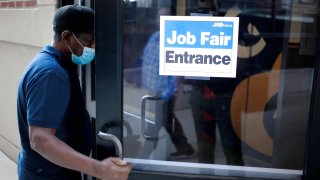
Stocks looked to enter the long weekend on a dour note after a disappointing August jobs report.
Nonfarm payrolls rose by 235,000 last month, less than half the gain of 720,000 expected. Economists had forecast employment data to match previous months of robust recovery, but delta variant concerns and labor supply issues weighed on the economy.
Here are five experts on what this means for the Federal Reserve's tapering timeline and the U.S.' economic recovery in the months to come.
Get South Florida local news, weather forecasts and entertainment stories to your inbox. Sign up for NBC South Florida newsletters.
Kate Moore, head of thematic strategy for BlackRock's Global Allocation investment team, says it's part of the broader supply chain issue.
"We just don't have supply of the workers. We don't have supply whether it's in the supply chain, inventories across a variety of different industries. This is something that companies have been talking about consistently over the course of the summer. They talked about it during earnings calls ... And there does really seem to be a limitation or at least a headwind to progression in economic growth due to supply-side constraints. If it was demand side, I think I would be more worried and more concerned about how the equity market would interpret it."
Nela Richardson, chief economist at ADP, is looking for growth at one end of the labor market.
Money Report
"Where we're going to see the gains, the industries and the jobs that are most poised for gains in the second half of the year are those low-paying jobs that were lost, so it's very likely that that wage growth declines as these jobs come back and more people come into the labor market. It could be just the artifact of the composition of jobs that are out there now, not really reflective of what would be needed if we were to see a fullsome labor market recovery, which means getting those low-paid jobs back into circulation as well."
Judy Shelton, economist and former Fed nominee, is watching the impact on the Fed's timeline.
"I think that number is very sad in terms of the real economy, but in some ways it makes for a field day for Fed watchers because now the focus will be on the buildup not just to the Sept. 22 announcement as to whether the Fed will begin tapering, it could be now Nov. 3 or Dec. 15. If we are seeing people not going back to work despite all of the 'Help Wanted' signs everyone is seeing in so many shops and restaurants and service industries, if we're not seeing that, how can the solution be for the Fed to buy more Treasury securities, more agency mortgage-backed securities? I just don't understand how the Fed can justify its prolonged monetary accommodation. It's just more cowbell. It's always the solution."
Diane Swonk, chief economist at Grant Thornton, says this is part of a broader slowdown.
"Unfortunately, we're seeing a huge deceleration globally as well. We've seen really weak numbers come out of China recently, the delta variant is hitting economies that escaped other waves, and I think that's very important to take into context. That hurts the supply chain disruptions that we've seen erupt out there but it also hurts demand. The labor supply issue goes so much deeper. This is both a collision of supply and demand, but demand has slackened. That really has to be underscored. We are looking at GDP growth below 4% in the third quarter now. That is a major slowdown in momentum ... We see child care issues, child care hiring at child care services actually fell again for the second consecutive month, and we saw participation rate among some of those that are single mothers that are the most vulnerable to this still weak, and they are the ones that are going to be not able to return until their kids can stay in school. And the fact that many schools are going back into quarantine after they open, that further mucks up this idea that we had that the labor supply would be there much more readily as we reopen schools, and I think that's another issue."
David Kelly, chief global strategist at JPMorgan Asset Management, says watch out for September's jobs report as it could show the impact of the delta variant spread.
"Over the last two years, if you look at the wages of production nonsupervisory workers, they are up 9.9% over a two-year period; that is the strongest we've seen in 40 years. And what it says is that for various reasons, there just isn't labor supply in America right now. We've got 10.1 million job openings, half the small businesses in America have jobs they can't fill, so this is really a labor supply constraint, it's a supply constrained economy. I do think the delta variant is going to have a significant impact in September, more so actually than in the August report because I think it sort of gathered pace over the course of the month. So you've got a slower growing economy, you probably still have higher interest rates because you've still got higher inflation; that's going to be challenging for the equity market. And so I think it's very important to buy things that are well priced here that don't have huge P/E ratios, huge multiples, because those things will be challenged in a global economy which is growing more slowly with higher inflation and interest rates."






